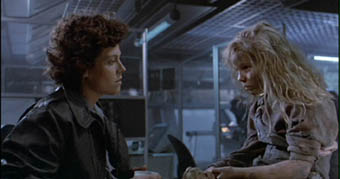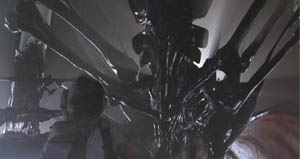|
Sometime in the near future, very soon, perhaps yesterday, some guy will be saying to his friend who is hypothetically named Steve, "Hey Steve, remember back when sci-fi movies didn't look like total shit? Remember when they weren't all a lot of glorified video games with fakily-smooth movement and pointless bullet-time shots? Remember when people had the crazy notion of actually making things, putting them in front of the camera, and photographing them? Remember how good it looked when they did that? The hell happened to that school of thought, huh Steve? Steve? Hey asshole, I'm talking to you! Wake up and pay attention to me, dammit!"  Regardless of whether or not Steve remembers it, I do remember when movies consisted entirely of things somebody had genuinely filmed instead of faking in some ne'er-do-well silicon box of evil. Aliens was part of that last wave of effects-oriented pictures to be done entirely practically; Cameron's very next film would introduce the world to one of the very first, or at least the first particularly famous, CGI effects. It would also usher in the era of "James Cameron's forgotten how to pace a film so it doesn't drag out interminably," but here, with this film, he was truly at his peak, and it was a pretty impressive thing to behold. Even after countless lesser imitators, Aliens remains one the greatest action flicks ever; in fact, virtually perfect within its genre. Wisely choosing to avoid a simple retread of Ridley Scott's original Alien, Cameron made the sequel a big, loud shoot-em-up to contrast with the original's creepy, almost documentary-style approach. Make no mistake, there are still plenty of creepy, anticipatory sequences here, but who's kidding who? You've seen this film already. Everyone's seen this film already. Most of us have seen it enough times to immediately think of it whenever we see a Spunkmeyer sausage or hear the phrase "game over" in any context. Why is Aliens so much better than any of the other subsequent "bug hunt" flicks that were making stabs at the same target? Partly, it's the direction. I'm not an ardent supporter of James Cameron in general; he always seems like a guy who has a measure of greatness within his grasp that he then screws up with something ham-handed or pointless (the ending of The Abyss comes suddenly to mind). Here, however, he knows exactly what he's doing. His characters are, if not terribly complex, at least likeable and well-played; who can forget Bill Paxton's career-making role as Private Hudson, the most quotable bellyacher in the last few decades of film? Maybe Steve, but he's a slackass moron anyway. This ain't about Steve's point of view; he's too hypothetical and lame to give any insight. Where was I? Oh, yeah. While I'm on the characters, I'd like to note that, unlike most films in the "thriller" genre, nobody does anything stupid here, a la "hey guys, I'm just going to leave my gun here and go out into that dark corridor to take a leak, okay? I'm sure I'll be juuust fiiiine." Okay, Ripley flaming the eggs wasn't the brightest of all possible moves, but, and this is the important thing to note, it is something we can honestly believe that the character would do.  Please be cognizant of the fact that my praise for the pacing and structure is aimed at the original theatrical cut, and not the "director's cut" rerelease, which added a lot of material that was mostly unnecessary. Mostly. The scene of Newt's family finding the derelict spaceship from whence comes the titular aliens does clarify some of the more vague aspects of how the colony came to be besieged to begin with, though it simultaneously lessens the tension by letting the audience in on what Ripley and the marines are going to find when they arrive, instead of putting us in the same shoes as the characters. It's a tough call. However, there is no need to have a subplot about Ripley losing her daughter just so a helpless waif can then be dangled in front of her a short time later; that would be the sort of ham-handed, obvious excuse for motivation that later Cameron films started suffering from after he got freer rein with the final cut. Protecting a lonely, traumatized child hardly needs any explanation; it's hard-wired into our species to care about such things. Adding in some blatant emotional transference as a reason for Ripley's protection of Newt just makes the filmmaker seem incompetent and distrustful of his own attempts to depict sincere emotion. On this "long cut vs short cut" issue, I seem to be in the minority, but that's nothing new. The Steves of this world can take a flying leap. As previously mentioned, the Stan Winston and Fantasy II practical effects gags wipe up the floor with modern CG effects. We never doubt that the aliens are really there and interacting with the sets and actors, because they ARE. I don't know why Hollywood at large has forgotten this fact, but a lot of filmmakers could benefit from taking a gander, or even a whole flock of them, at this film and remembering a none-too-distant time when people weren't afraid to use actual smoke and mirrors, and got spectacular results that in no way resembled a Playstation's view of the world. Even if James Cameron never does another great film, he'll at least always have this one for us to revist. From the simple but tremendously effective technique of showing hordes of blips on a motion tracker to the harsh lighting and vertically ambiguous shots of hideously spiny things crawling "outta the goddamned walls!" he shows a great eye for visualizing the nightmarish. Sometimes less really can be more. Sometimes more is also more, and we get that, too. A double victory! I wonder how much money James Horner has made in royalties from having the finale to his Aliens score used in every trailer ever made since 1986. Remember when it came up in the teaser for On Golden Pond II? That was awesome. -review by Matt Murray
|
|
||||||||